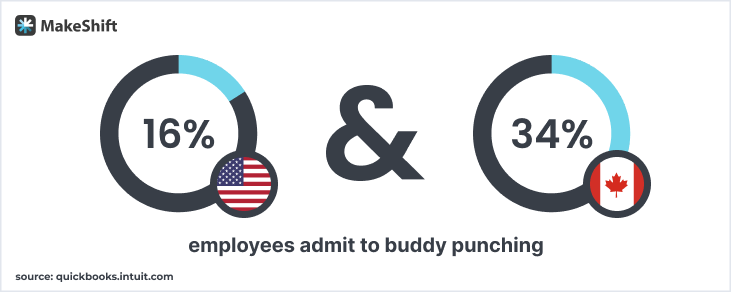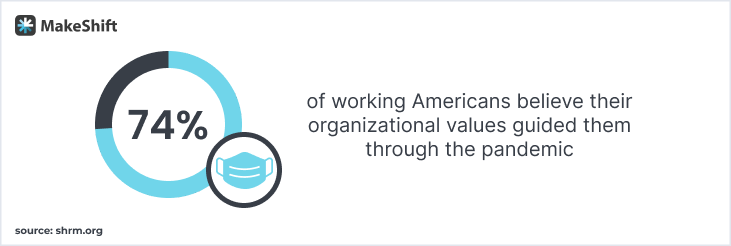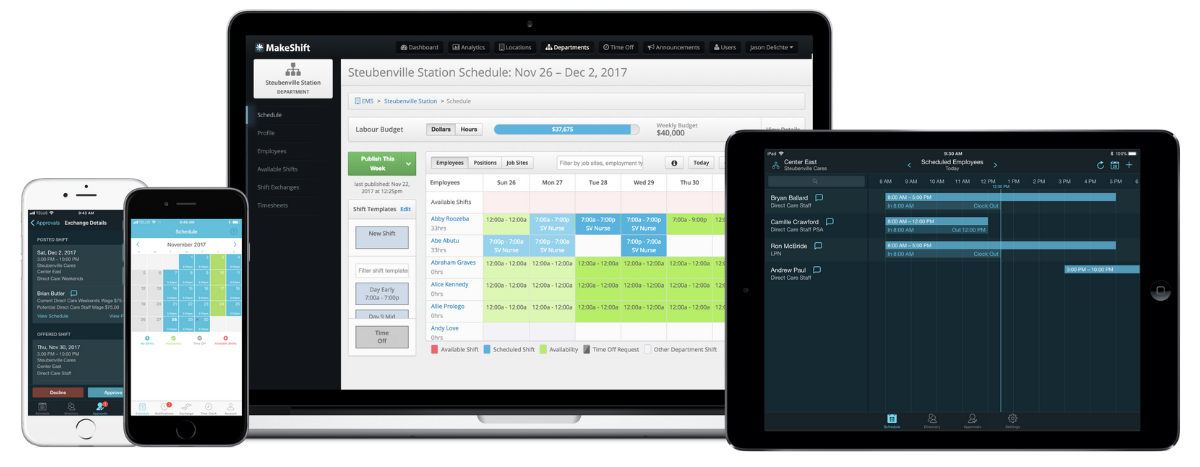Buddy punching and time theft affect 75% of all US-based businesses. In fact, US businesses lose up to $110 million per day because of employee-related crimes.
Time theft is when employees accept pay and stay clocked in for hours they didn’t work. For example, if an employee stays clocked in during breaks or when they run non-work-related errands, this is time theft. However, the most significant culprit of time theft is buddy punching.
So how can you prevent buddy punching and time theft?
In this guide, you’ll learn five effective ways to prevent buddy punching and time theft at your company.
What is Buddy Punching?
Buddy punching occurs when an employee clocks in for another employee.
For example, if an employee, Tiffany, is running late to work, she can send a text message to her coworker, Michael, asking him to clock in for her.
Michael can quickly run over to Tiffany’s time card and clock in for her. Or, if Tiffany wants to leave the office before the workday is officially over, she can ask Michael to clock out for her at the correct time. Michael can then punch out for Tiffany when he leaves the office himself.
These are both examples of buddy punching. Since Tiffany has Michael clocking in and out for her, she’s being paid for time she didn’t actually spend working.

An independent survey of 1,000 employees in 2017 discovered that 16% of US employees and 34% of Canadian employees admit to buddy punching. Ultimately, buddy punching is a form of theft and can have severe consequences for your business.
What Are the Consequences of Time Clock Fraud?
Buddy punching results in compounding loss and substantially adverse effects on your business.
However, let’s take a closer look at the consequences of buddy punching and time clock fraud. This way, you’ll have a better understanding of the effects buddy punching has on your organization.
Increased Payroll Cost
Time theft and budding punching have several adverse effects. However, the primary consequence of buddy punching is how it impacts your company’s bottom line.
Buddy punching causes your company to spend money on fraudulent labor hours. Therefore, buddy punching increases your average payroll cost per hour worked. For example, let’s say an employee who works 40 hours per week buddy punches 5 hours every week.
As such, the employee is actually working 35 hours per week. However, since you’re paying the employee for 40 hours, your payroll cost is 5 hours extra based on the work output from the employee. These buddy-punched hours compound over time and can cause significant losses to your company.

Buddy punching is a widespread problem in the United States, costing employers over $373 million every year.
Declined Workplace Productivity
When buddy punching occurs, you won’t have an accurate description of how productive your team is. This is because the numbers on the time clock are exaggerated. Furthermore, buddy punching causes your business to lose productive work hours.
Since your employees are receiving payment for unworked hours, they aren’t providing the appropriate work output they are being paid for.
Low Employee Engagement
Buddy punching is highly correlated to low employee engagement because it creates a culture of dishonesty. Employees who buddy punch know they’re being dishonest, and, if left unchecked, contribute to a company culture that rewards corrupt behavior. This, in turn, can affect employee engagement across the company as other employees notice what’s happening. If your employees realize they can get away with time theft, it can lead to additional dishonest behaviors.
How to Prevent Buddy Punching
Buddy punching is a very real problem within many organizations and needs to be addressed before it gets out of control. If you don’t properly address buddy punching, your business may not be sustainable in the long run.
So, here are five ways you can prevent buddy punching at your company.
1. Find the Root Cause of Buddy Punching
Ultimately, there’s a root cause as to why your employees are buddy punching. Therefore, it’s your duty to understand why they’re buddy punching and how you can help them. Buddy punching may be caused by any number of reasons.
For example, your employees may be buddy punching in retaliation to their bosses. It may also be caused by insufficient paid time off benefits or untimely paychecks. Or, maybe they're buddy punching because of unideal work conditions such as being micromanaged.
You get the point.
No matter what the reason is, it’s crucial to speak to your employees who are buddy punching and come from a place of empathy and compassion. You never know what your employees are going through and why they feel the need to buddy punch and jeopardize their employment.
Rather than actively trying to terminate buddy punchers, it’s more optimal to work together to find a solution. After all, you’ll need to find a replacement if you terminate a buddy puncher. This uses more company resources and time.
You already hired your employee in the first place, which shows they have the skillset and aptitude to perform their job functions. Sometimes all your employees need is some encouragement and someone who understands their problems. Always put your people first and give them the help they need to succeed.
2. Use Scheduling Software With Time Clock Features
New technological innovations allow businesses to prevent buddy punching effectively. One of these software solutions is MakeShift.
MakeShift is comprehensive scheduling software that offers a heap of valuable scheduling features, including time and attendance tools.
With the MakeShift mobile app, your employees can clock in and out from their phones or an on-site device.
Now you may be thinking, can’t my employees still commit time fraud by clocking in at an off-site location? For example, if an employee is running late to work, won’t they be able to clock in from their phone while they’re driving?
The answer is no.
MakeShift offers geofencing, which means your employees can only clock in if they are on-site. Geofencing can be defined as location-based clock-ins.
| MakeShift Expert Tip: You can also require your employees to take a selfie in order to officially clock in. This helps prevent people from punching in for each other. |
If you still use manual time cards at your business, now’s the time to make the switch to a more effective digital solution in MakeShift. As a PeopleFirst scheduling tool, MakeShift’s goal is to provide a better quality of life for both your employees and managers.
MakeShift’s full suite of scheduling tools allows your employees to quickly and accurately clock in and out. Furthermore, your managers can accurately track time sheets and approve them for payroll.
In summary, MakeShift’s time and attendance tools prevent buddy punching through:
- Geofencing clock-in with employee mobile app
- Photo requirement to confirm clock-ins
3. Build Better Staff Schedules
Another way to prevent buddy punching is by creating better staff schedules. Your employees might be buddy punching because of poor scheduling. So if your schedules allow for very little work-life balance, your employees may end up fatigued, burnt out, and may ultimately quit.
Building better schedules starts with taking a people-first approach. This means empathetically considering employee availability and preferences when making your schedule. While you can do this even when manually scheduling your staff, it’s usually harder to scale. Manual scheduling also reduces your ability to quickly course correct in the event of last-minute absenteeism. Cloud-based scheduling software, like MakeShift, makes the whole process a lot easier by:
- Allowing employees to set their own availability with the mobile or web app.
- Letting employees submit time-off requests.
- Authorizing employees to conduct shift swaps.
Because of this, your scheduling managers can quickly create schedules that accommodate your employees' scheduling preferences reducing the need to buddy punch.
MakeShift also provides fatigue management rules. Fatigue management rules help avoid fatigue scenarios where employees are overscheduled and overworked. You can add various fatigue management rules inside MakeShift’s dashboard. So if a scheduling manager overschedules an employee, a warning notification will appear in real-time.
At the end of the day, your employees are the heart of your organization. They keep your company running and your customers happy. So if your employees aren’t given the tools and accommodation they need to be productive, it can result in buddy punching, time theft, and even more severe implications.
4. Create Formal Clock Buddy Policies
Oftentimes, the quickest and most affordable solution to buddy punching is addressing it head-on. Therefore, you must either refine or create a new buddy punching policy and show it to all of your employees. Your buddy punching policy should make it clear that there is zero-tolerance for time clock fraud and time theft.
It should also be clear that both employees who buddy punch for each other are subject to consequences. This way, employees are less likely to help each other buddy punch.
However, it’s up to you to decide if you want to give warnings before terminating the employee. Each company has different cultures, policies, and moral codes. For this reason, employee termination can vary from case to case, depending on the severity and reasoning of the employee.
5. Create a Positive Company Culture
It’s true, happy employees are less likely to conduct any fraudulent actions that would jeopardize their job. Therefore, it’s important to create a company environment where your employees don’t dread coming in to work every day.
However, unfortunately, the COVID-19 pandemic made life much harder for workers.
Since they were likely working from home, they lost their routine and attachment to your organization. So as the pandemic situation continues to improve, creating a positive company culture is vital.

According to a report by the Society of Human Resource Management (SHRM), 74% of working Americans believe their organizational values guided them through the pandemic. Companies that thrived during the peak of the pandemic already had positive workplace cultures and extraordinary employee support.
You can join these thriving companies by being intentional with your company’s core values and cultural initiatives. Your goal is to create an environment where your employees feel valued and have a voice.
For example, you can provide rewards and recognition for good attendance and performance. And you can create a positive, inclusive culture by promoting diversity. This involves working with the HR department to create diversity initiatives and make diversity a part of your company’s recruitment strategy.
All in all, your employees want to work at a place where they are comfortable and respected.
How can your employees enjoy coming to work if they think the environment is miserable?
Company culture starts at the top, and your leadership team needs to set the tone. No matter what your company’s culture is, it reflects the company values and priorities of your leadership.
HR teams can then look to refine and expand a strong company culture. Your employees should have outlets where they can express their feelings toward the company and their job.
Use MakeShift to Stop Buddy Punching at Your Company
Buddy punching is a significant workplace offense because it affects your company’s bottom line. With MakeShift’s geofencing and real-time photo features, you can prevent buddy punching. MakeShift improves your company’s productivity and sentiment because it allows you to create effective staff schedules.
Want to see how MakeShift can prevent buddy punching and time theft? Start your 14-day free trial today.








